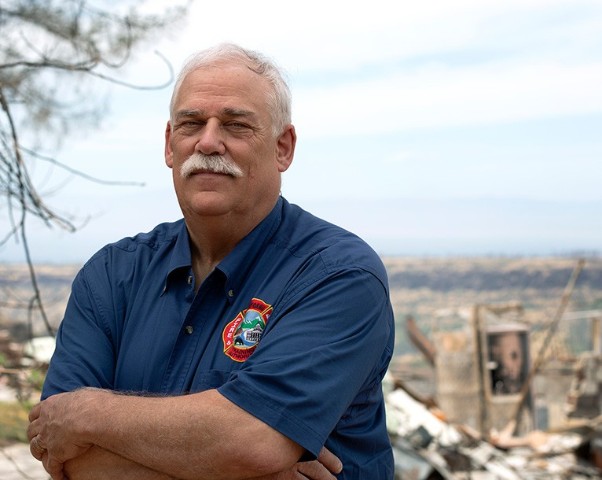Reliable, resilient communication is critical during emergency and day-to-day operations
Posted on October 28, 2019

One of our most critical items during emergency operations and for day-to-day is to have reliable, very resilient communication capability. So we can communicate amongst ourselves and with other fire agencies. And just as importantly, so we can communicate with the public.
As the Wildland Fire Policy and Technology Advisor for the Western Fire Chiefs Association, I’ve been helping to deal with the wildland fire problem in the Western United States. Part of my job is to work with the states and territories in the West to come up with a better policy. At the same time, we're working on innovative technologies that we can use to assist us in all phases of emergency response and recovery.
That’s where FirstNet comes in.
FirstNet is bringing more reliable capability, targeted for first responders. And that's what really needs to happen in today's day and age – so we’re not competing with commercial traffic out there.
We have a system that we asked for – built just for us. We have priority, we set who needs to have it, and the system's only getting better and better.
FirstNet adoption
One of the things that drove me towards FirstNet when I was California State Fire and Rescue chief for the Governor's Office Emergency Services Fire and Rescue was the new technology. As we started to move forward, we put our entire fleet on Fleet Complete for FirstNet.
Fleet Complete allowed us to track our fleet and see where our people were at any given time – both for safety and so we could direct or redirect our apparatus as needed. We could also see how many miles we’d driven on the vehicles and when the apparatus was pumping and how many hours it had pumped. We could geo-fence the apparatus to a given area. And when it left, we would get an electronic notification.
It’s been great. And it’s going to have even greater capabilities with the continued FirstNet buildout up and down the state, as well as the country.
Those are the types of things we're looking at. While this originally started as a situational awareness tool for our fleet, it's going to save us even more money on the maintenance.
Caring for first responders
We want to take very good care of our first responders, so they're able to complete their mission and provide for the public out there each and every day.
In November, when the Camp Fire started here just below Paradise, we knew it wasn’t going to be a good day. It turned out to be, for California, one of the worst days on record. Within a couple hours, we had two fires start in Southern California, that would become disastrous fires, at least in LA County's history.
The destruction was unbelievable. While we don't have everybody on FirstNet here in California yet, we do have a lot of folks on board. We were able to reach out as a FirstNet subscriber, and request FirstNet deployables to assist us at the Camp Fire in Paradise, and at the Woolsey Fire down in Southern California.
Having FirstNet helped not only the boots on the ground, but the incident command team and the staff manage the incident. We were able to push data back and forth. We could supply information to the public and to the coordination points within the state, as well as to the state legislature, and all the way to D.C.
By having multiple deployables and capability – and intermixing it with other support– we had more robust capability to assist us in performing our mission.
Why FirstNet?
What I tell most folks is that if you're not on FirstNet now, it's probably because they haven’t built it out in your area. Or maybe you don’t know about it. Become more aware of what it can and will do for you. Because you're either supplying resources and mutual aid to somebody. Or you're the one receiving mutual aid.
And we have to have one way to communicate, one way to be able to share information back and forth. That's FirstNet. That’s what we asked for and that's what we got from Congress. Now it's up to us to complete and work with them to build it out.
If I had to describe FirstNet in one word, it'd be "Wow." It's amazing technology.
We've always fought for access with the public. During emergencies – especially the larger ones – everybody's got a cell phone and everybody gets on board. It becomes like the freeways where you can't move. Now, we've got a network that allows us to communicate back and forth.
And we won't have log-jams, the way we do with other providers. So let's get on board, let's save lives, let's make our situational awareness better.
Kim Zagaris is the Wildland Fire Policy and Technology Advisor for the Western Fire Chiefs Association. He recently retired as California State Fire and Rescue chief for the Governor's Office Emergency Services Fire and Rescue, where he coordinated the state's emergency response to major and other catastrophic events. Zagaris also chairs the International Association of Fire Chiefs Emergency Management Committee, which serves as the mutual aid and emergency management committee. And he sits on the Urban Search and Rescue Committee that works with the Urban Search and Rescue groups.